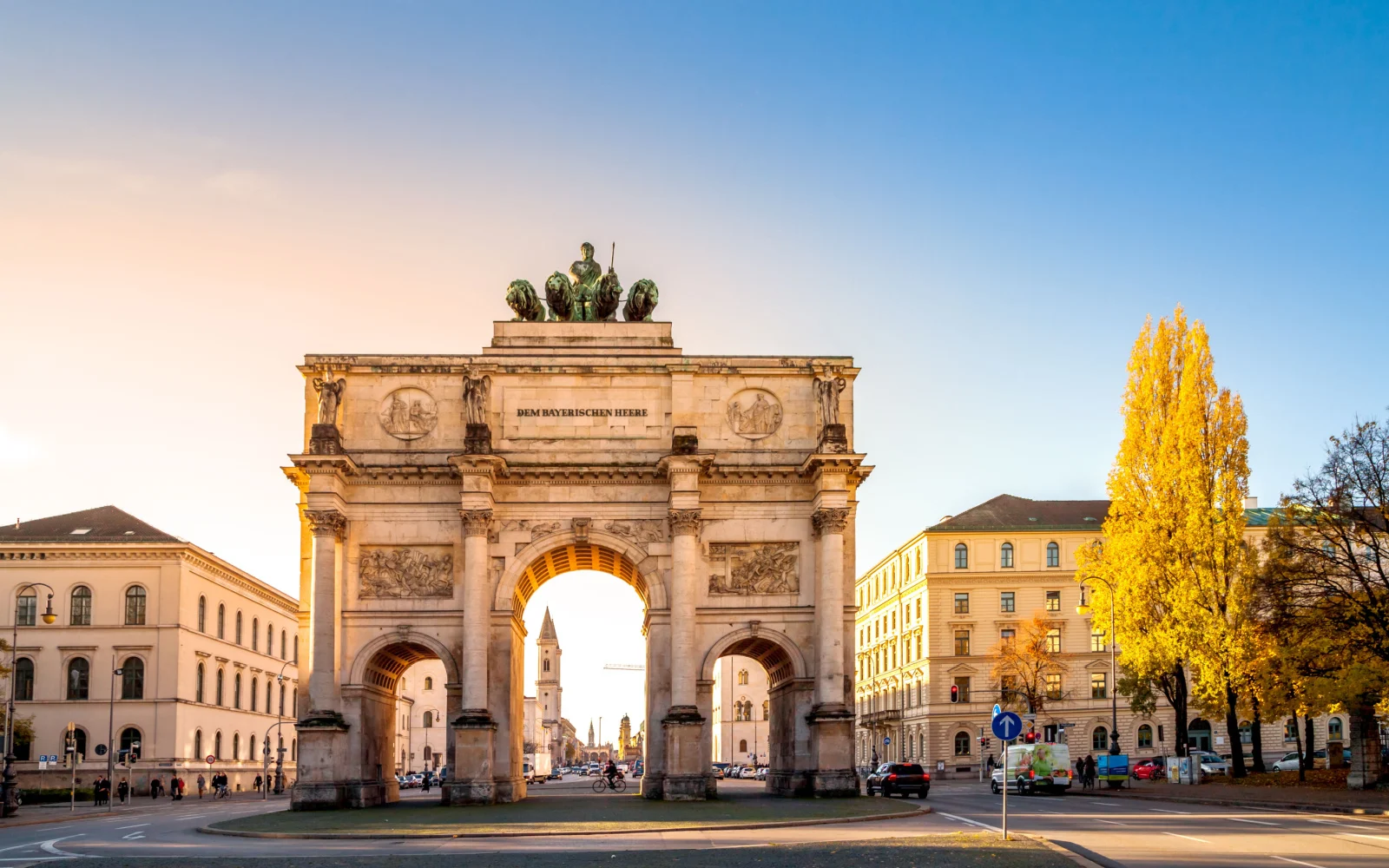What's the best time to visit Munich?
Visiting Munich from June to mid-September offers perfect weather for outdoor activities and exploring the city’s famous beer gardens and parks. Despite higher hotel prices, this period features pleasant temperatures and hosts major events like the Munich Film Festival and Munich Pride. Summer’s warm weather also enhances day trips around Bavaria, including to Neuschwanstein Castle.
The Bavarian city of Munich is most famous for its beer festival Oktoberfest, but it has much to see any time of the year that you come to visit. The picturesque city center has plenty to see and do, such as the pretty Marienplatz square or the famous Neues Rathaus town hall.
Culture lovers can enjoy museums such as the Residenz or take a break from sightseeing in the English Garden. Of course, while in Bavaria you must visit a typical beer garden or beer hall and have some lager and bratwurst, even if you aren’t here for Oktoberfest.
Munich is also a great base for exploring the picturesque scenery of Bavaria, but for day trips you’ll probably want good weather. That’s why we put together this guide to help you figure out the best time to visit.
The Overall Best Time to Visit Munich
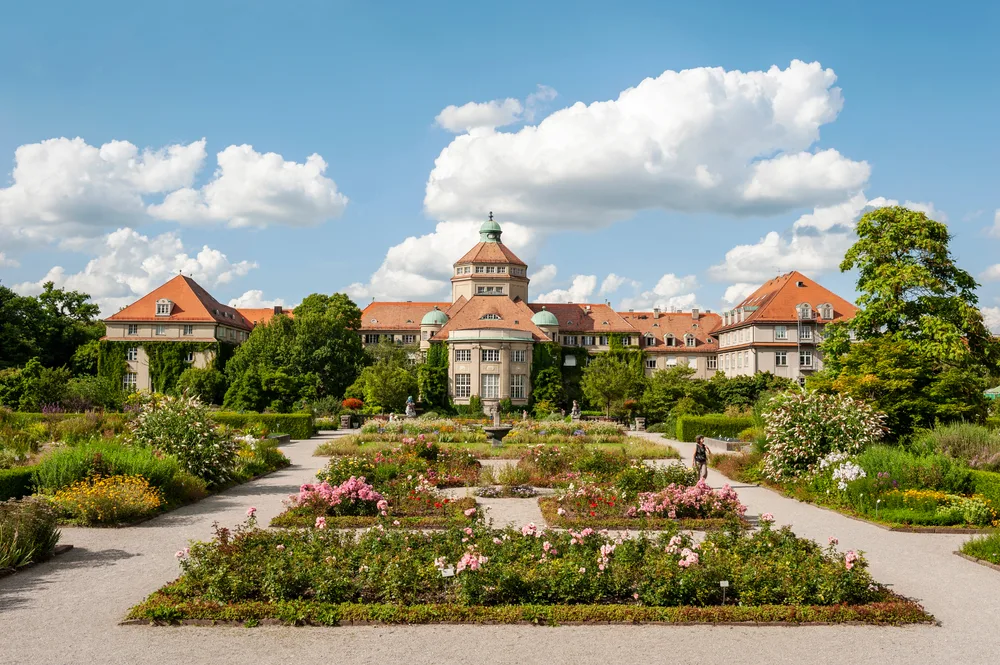
Munich-Germany, August 4, 2019: Botanical garden, Nymphenburg Castle In Munich/Jazzmany/Shutterstock
The best time to visit Munich is during the summer and early fall (June to mid-September). Although this is Munich’s high season, it’s worth coming because the weather is glorious and perfect for exploring.
Bavaria’s weather is famously cold and gloomy, but thoughts of this type of weather are far away when summer rolls around. High temperatures are usually pleasant, hovering around 75 degrees Fahrenheit in July and August.
Although June has frequent rain showers, July and August are usually sunny. Pleasant temperatures usually last until the beginning of September. You want to mind the weather because many of the best things to do in Munich are outdoors. You’ll be spending lots of time walking around and enjoying the beautiful scenery.
If you’re planning on taking day trips into the rest of Bavaria, such as the famous Neuschwanstein Castle, you want to come when the weather is at its best.
Munich locals tend to be outdoorsy types, so visiting during the summer allows you to join them on some of their favorite activities. Head for a stroll or a picnic in one of the many parks and green areas around Munich, such as Olympic Park.
If you’re feeling daring, take a plunge in the Isar River, where most locals go to cool off. Even if you’re not the outdoorsy type, you can enjoy the great weather by attending one of Munich’s most popular attractions—the beer gardens.
Munich’s famous beer gardens serve local lager on tap and allow visitors to bring their own picnic lunches. They’re the perfect place to relax and people watch, but they’re only open during the warmer months of April to October, so take advantage of the warm weather.
Summer is the high season in Munich, which means that hotel prices will go up a bit. However, there are plenty of outdoor activities that are free, such as arts festivals and movie screenings.
Summer is the high season for festivals in town, so keep an eye out for top events such as:
- Munich Film Festival (June)
- StuStaCulum (June)
- Munich Pride (June/July)
- Tollwood Summer Music Festival (June/July)
Least Expensive Time to Visit Munich
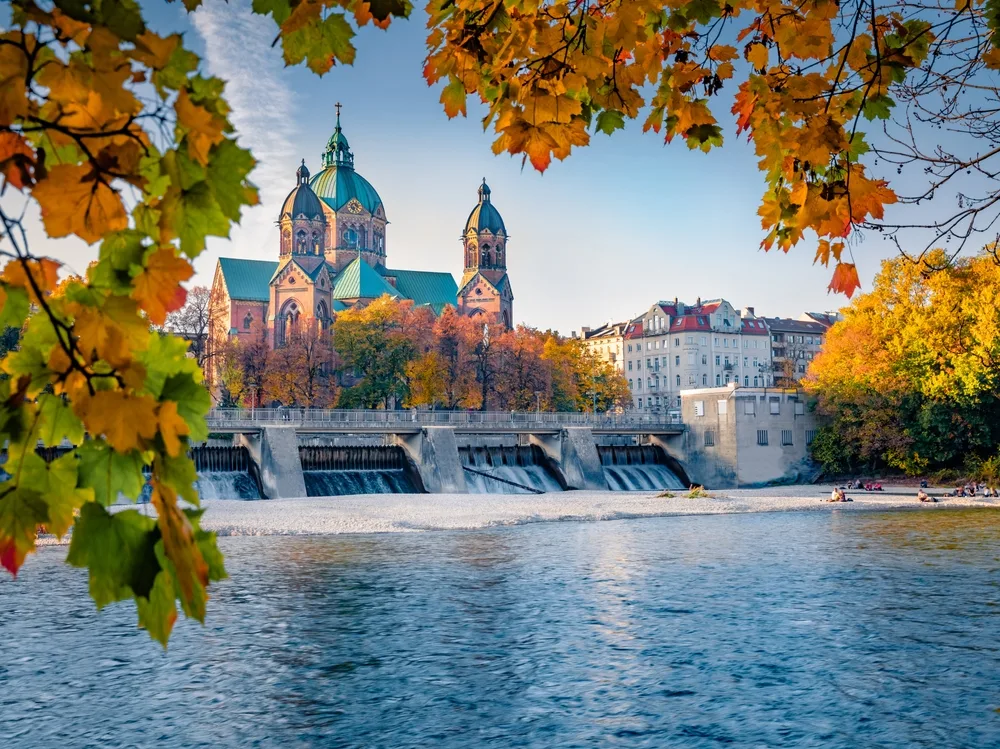
Andrew Mayovskyy/Shutterstock
The cheapest time to visit Munich (if there is even such a thing) is in the off-season. The least expensive time to visit is in January and February, when the colder, gray weather chases away many tourists.
Not all of winter is equally inexpensive. December is the Christmas season in Munich, when the city hosts its world-famous Christmas markets with mulled wine and Christmas gifts on sale. While this is a beautiful sight to see, predictably hotel prices go up during this time.
By January, the Christmas markets have shut down and hotel prices drop to the lowest they are all year. You can get savings of 20-35% on a hostel bed or a hotel room, even in hotels quite close to the center.
January and February are also the most affordable times to fly within Europe. There are no major holidays or vacation times that make prices go up, and many airlines offer discounts to get through the slow travel season. Intercity bus companies also have some discounts during this time.
Least Busy Time to Visit Munich
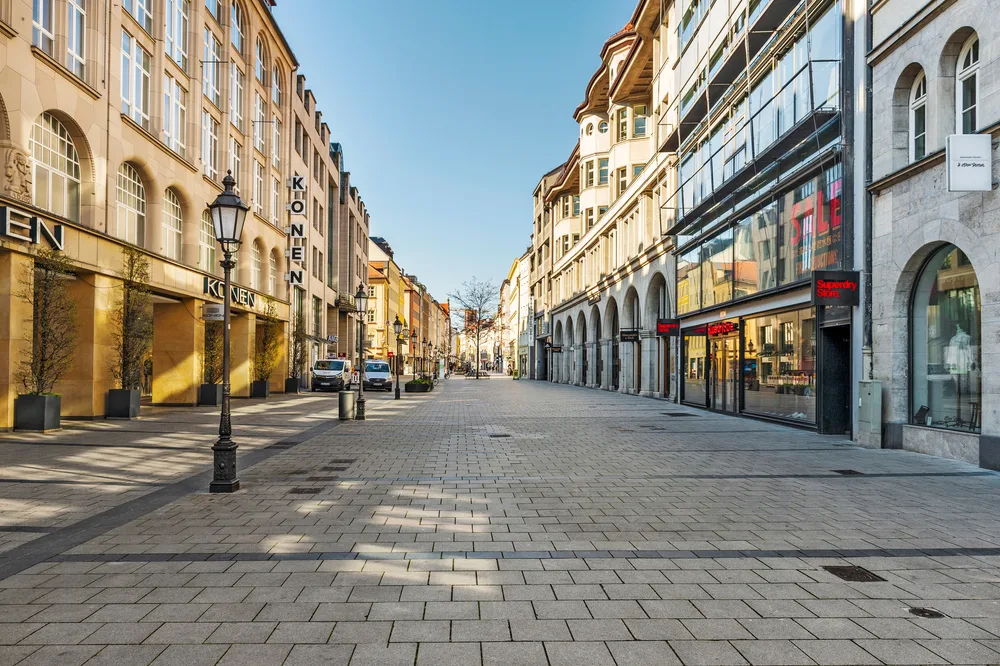
Munich ¬ Bavaria – Germany, 31. March 2020: Empty Sendlinger Strasse and city center of Munich, Germany because of shutdown due to corona virus/Jazzmany/Shutterstock
The least busy time to visit Munich is during late winter, but you can also beat the crowds and catch some of the good weather by visiting in spring (March-May).
As mentioned above, January and February are not popular months with visitors because the weather is cold and there isn’t as much to do. During these months, you can check out Munich’s indoor attractions such as the many museums and have them practically to yourself.
If you want to avoid the crowds but still have a better chance of experiencing good weather, visit during the spring. Munich spring is unpredictable, with warm sunny days followed immediately by blustering thunderstorms.
However, if you’re lucky, you can get a stretch of good days. By May, temperatures creep up to the low 70s, and outdoor attractions such as beer gardens open. The crowds don’t come until June, so this is the best time to experience the beer gardens.
There are also other outdoor events slowly starting up, such as flea markets and art fairs. Early spring is the best time to visit for foodies. March to April is white asparagus season, a German fascination so beloved there have even been newspaper articles about it.
Bavaria is said to have the best asparagus. You only have a narrow window of time to try this delicate treat few people outside of Germany know about, so come when it’s in the greenmarkets and on restaurant menus.
Worst Time to Visit Munich
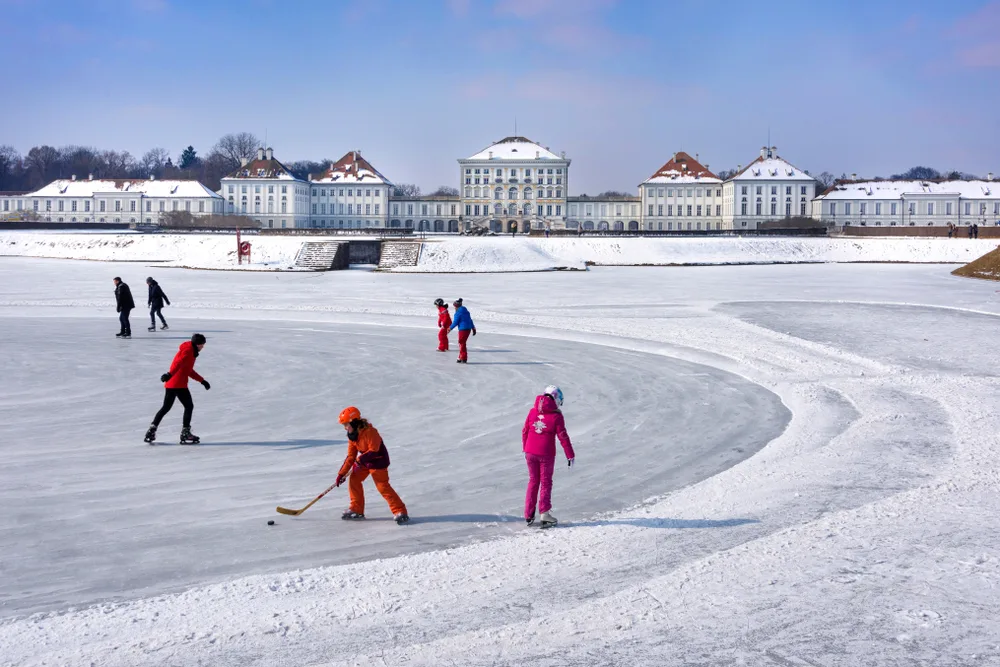
Germany, Bavaria, Munich, Nymphenburg Palace: Happy colorful dressed people men women children while ice skating on white frozen lake water at winter time – concept winter activity. February 28, 2018/Rolf G Wackenberg/Shutterstock
Unless you are coming specifically for the festival, the worst time to visit Munich is during Oktoberfest, when the city gets crowded and expensive.
Oktoberfest, Munich’s most famous cultural event, happens every year from mid-September to early October. The festival has been held since the 19th century to celebrate Bavarian beer and other aspects of traditional culture. Even today, most guests dress up in folk outfits of dirndls and lederhosen.
Oktoberfest is a draw for visitors, mostly young, from all over the world who come to have a hedonistic good time. However, if you’re not one of them, you’ll probably not have a good time. The crowds are thick and often rowdy with people inebriated at all times of day.
Plus, visiting during Oktoberfest is the most expensive time to visit Munich. Hotel prices are 20-30% more expensive than they are even in the summer, during the other peak season, and fill up quickly. Unless you want to visit Oktoberfest, this season is best avoided.
The rest of autumn is actually a beautiful time to visit Munich. In early September you can catch the beautiful warm weather, while by the end of October the leaves have changed color and the mountains are pretty.
Things to Consider
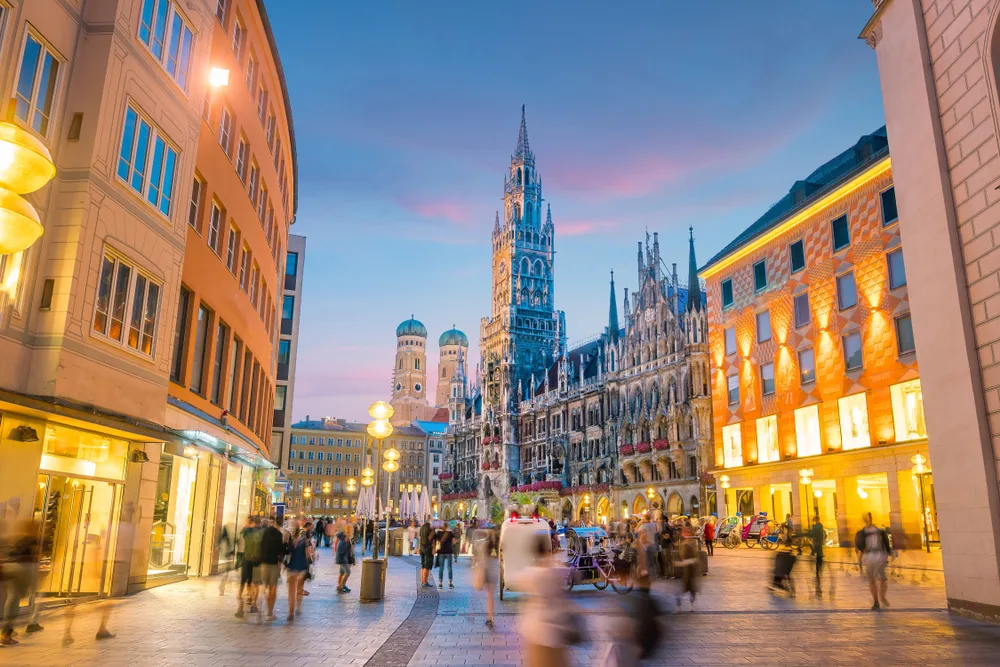
f11photo/Shutterstock
Here are some other tips to help you figure out the best time to visit Munich:
- Oktoberfest is not actually during October. Most of the festival takes place in late September. Check when the dates are for the next year before booking to avoid disappointment.
- Bring a raincoat and umbrella. Munich has a rainy climate no matter what time of year you go. Even winter is often more rainy than snowy, despite what you may see on all the postcards. It’s better to be prepared.
- Budget extra. Even if you visit during the off-season, Munich is still fairly expensive. It’s one of the most expensive cities in Germany.
Frequently Asked Questions
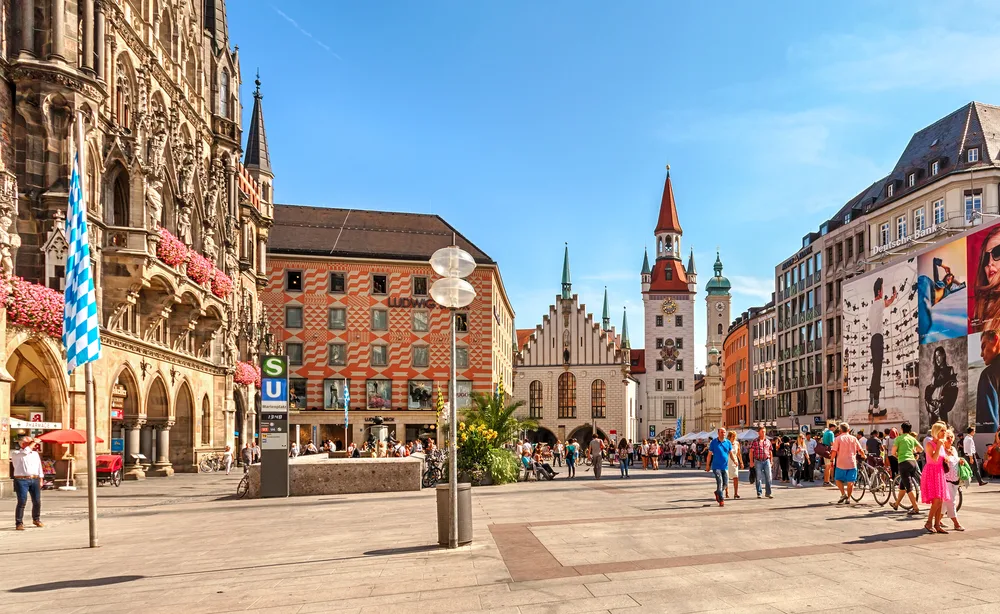
Munich, Bavaria, Germany – September 15, 2016: Old Town Hall at Marienplatz Square/Bahdanovich Alena/Shutterstock
Here are some of the most common questions people have asked about visiting Munich:
What month is Munich at its best?
Munich is at its best in May, when the weather warms up, but the crowds aren’t there yet. Outdoor events tend to start back up in May as well.
How many days are ideal in Munich?
Three days are ideal for exploring Munich. While you can see the best of the city in just two days, an extra day allows you to take a day trip into Bavaria.
Which month is the coldest in Munich?
January is the coldest month in Munich, with temperatures hovering around freezing. Snow and freezing rain are also common.
Is winter a good time to visit Munich?
Winter has the worst weather in Munich, but there are some other benefits to visiting during this time. In December, the atmosphere is cozy and warm thanks to the Christmas markets. Winter is the least expensive and least busy time to visit Munich, making it perfect for budget travelers.
Which season is best for Germany?
Summer is the best season to visit all of Germany thanks to the warm, sunny weather in the normally gray country. However, keep in mind that this is also the most popular time to visit Germany.
So, What’s the Best Time to Visit Munich?
For good weather, beer gardens, and the liveliest city, the best time to visit Munich is during the summer. To save money, visit in January or February. Party lovers should come during Oktoberfest, but other people should avoid the city during this time as it gets crowded and expensive. Happy travels!



